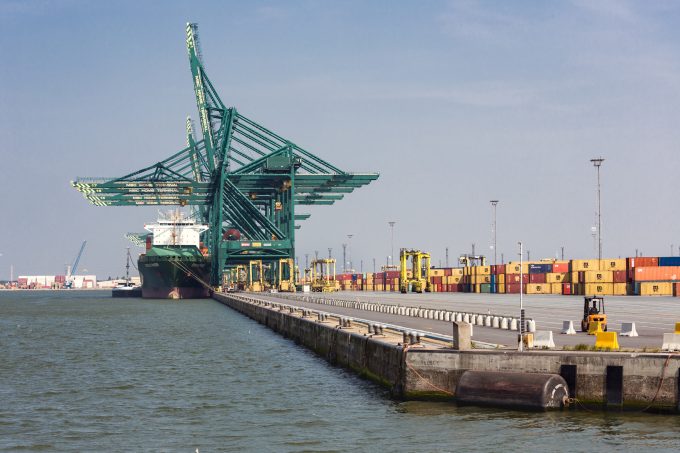Nickels and dimes: Wilson Sons 10% down on MSC buy. Why?
M&A desk musings
GM: RAISING THE ROOF GGM: IN FULL THROTTLE GZIM: MAERSK BOOST KNIN: READ-ACROSSMAERSK: NOT ENOUGHMAERSK: GUIDANCE UPGRADEZIM: ROLLERCOASTERCAT: HEAVY DUTYMAERSK: CATCHING UP PG: DESTOCKING PATTERNSPG: HEALTH CHECKWTC: THE FALLGXO: DEFENSIVE FWRD: RALLYING ON TAKEOVER TALKODFL: STEADY YIELDVW: NEW MODEL NEEDEDWTC: TAKING PROFIT
GM: RAISING THE ROOF GGM: IN FULL THROTTLE GZIM: MAERSK BOOST KNIN: READ-ACROSSMAERSK: NOT ENOUGHMAERSK: GUIDANCE UPGRADEZIM: ROLLERCOASTERCAT: HEAVY DUTYMAERSK: CATCHING UP PG: DESTOCKING PATTERNSPG: HEALTH CHECKWTC: THE FALLGXO: DEFENSIVE FWRD: RALLYING ON TAKEOVER TALKODFL: STEADY YIELDVW: NEW MODEL NEEDEDWTC: TAKING PROFIT

Major cultural and structural changes are needed before the severe barge congestion at Antwerp and Rotterdam eases.
Shipping consultant SeasC4U owner Gunther Ginckels told The Loadstar a fragmented barge industry at the mercy of inland terminal operators was to blame for the delays at the European ports.
Dispersed underloaded discharge and loading sequences were the norm for the region, he added.
Mr Ginckels’ comments came as Rotterdam announced its 2017 first-half throughput had grown 9.3% year on year, to reach 6.66m teu, which is likely to put further pressure on hinterland logistics operators.
“You are seeing situations where 30% (at Rotterdam) or 40% (Antwerp) of barges are arriving with 60-75 containers for deepsea terminals, despite having a capacity of 200-300 teu” said Mr Ginckels.
“This is because of the fragmented nature of barge operations and because loading is focused on the needs of inland terminals not the discharge requirements of the ports.”
There are over 7,000 barges on Northern Europe’s waterways, roughly 70% are “father-son” operations with three barges or less per company. This equates to around 1,600 barge operators.
According to Mr Ginckels, these small operators have no direct contact with cargo owners and are instead contracted by inland terminals or brokers trying to squeeze the best deal out of them.
“By monopolising the industry, brokers and inland operators can make demands on independent barge operators or shippers, including use of their terminals and their barges,” said Mr Ginckels.
“So, you’ll have incidents where barges stop at terminals to collect just four or five containers and then have to move onto another terminal to collect the next set of containers.”
Pointing to MSC, by far Antwerp’s largest ocean carrier, Mr Ginckels said the line sees around 830 barges generate 67,000 moves at its Antwerp terminal each month – roughly 28 a day, each requiring an average of 80 moves.
In reality however, Mr Ginckels says, 76% of barges load less than 50 containers and 40% less than 15, failing to generate any economies of scale. As a result, port operators are left out of pocket as they require a disproportionate amount of labour, against the operational value, to handle the barges.
“Terminals seem to lack the courage to recoup these costs, as to do so they would need to approach the shipping companies and container lines,” said Mr Ginckels. “These are their customers and there seems to be some fear that by charging the proper costs associated with barge operations they could lose customers.”
“There are ways to address these problems, however, such as increasing port staffing pools but this brings its own issues: for instance, the social cost of off-work labourers,” he continued.
“I’d also like to see ports impose a flat minimum fee for 30 containers, with a sliding scale on additional containers that would make it more profitable for operators to bring in more containers.”
Rotterdam World Gateway has recently imposed a restriction on barge operations involving 15 containers or less.
Mr Ginckels also argued that deepsea carriers could help ease inland flows by adopting a more constructive partnership approach with terminals.
“By only agreeing to single-year contracts – rather than committing to multi-year deals – the carriers are failing to give terminals the confidence to invest in equipment or properly develop infrastructure.
“Post-panamax cranes cannot be purchased on single-year contracts, certainly not in the numbers required to handle the new ULCV ships, and this all has a knock-on impact in delays.”
However, Mr Ginckels was quick to note that this was not true of all carriers, citing Maersk and MSC as two operators that own their own terminals and are able to commit to multi-year contracts.
“As Antwerp is MSC’s main hub, it is doing the most to develop sustainable intermodality by investing seriously in barge-friendly facilities and concepts. Maersk is doing the same in Rotterdam at its APM Terminals facilities at Maasvlakte II.
“This will help reduce barge congestion, but what is really needed is for all parties to sit around a table and hash out a way to work efficiently together,” he said.
“Barge operators and terminals have to agree to minimum container regulations, use of dedicated quays and fixed berthing windows for all operators.”
Comment on this article
Antonio Zuidwijk
July 21, 2017 at 4:45 pmThis note of Mr Ginckels is not only very important for the ports of Antwerp and Rotterdam, where barge-traffic is the backbone of the “Intermodal Transport Policies of Europe”.
These are real examples of “Cheap and green supply-chains”, where all the costs that are generated to transport cargoes, are included:
Costs of infrastructure, congestion, accidents and negative impacts on the environment. Not only the freight charges by the transport-companies are taken into account as is done in many other regions. Many people are aware of the benefits that barge-óperations could show if better use of the riversystems would be made.
And one of the best examples is the River Paraguay-Parana in South America, which is hardly used for container-transportation. And those in Europe that now are rendering “consultancy” services in Buenos Aires, should make this information part of their good advices for the local authorities. Hope to see more of this kind of excelent information in the Loadstar. Antonio Zuidwijk http://www.antonioz.com.ar
Antonio Zuidwijk
July 21, 2017 at 4:47 pmMany thanks for considering my note in the”moderation-process”.